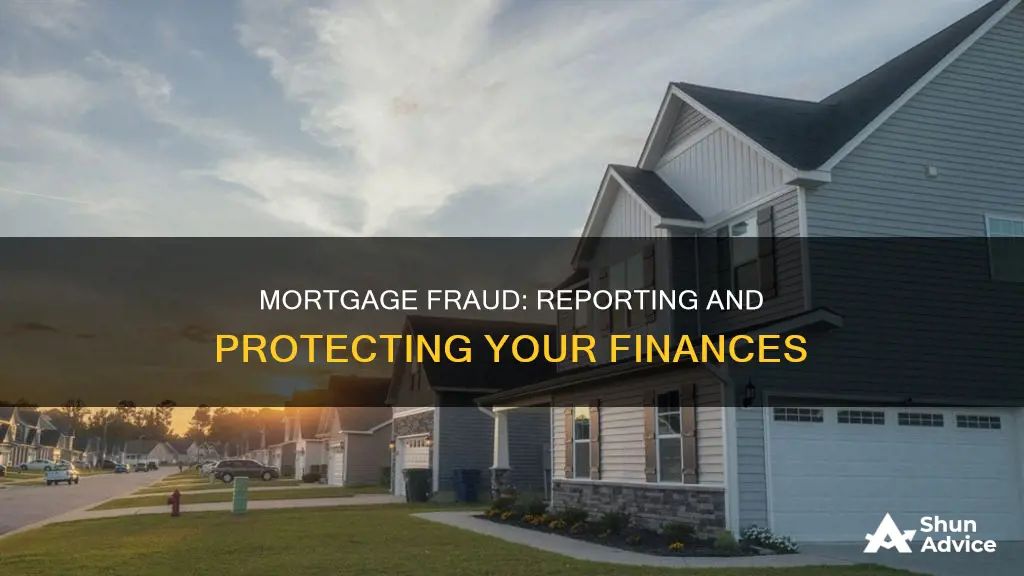
Mortgage fraud is a serious issue that targets individuals seeking home loans or financial assistance. It involves deceit or misrepresentation in the origination or funding of a mortgage loan. Fraudsters may offer misleading or deceptive loan terms, demand upfront fees, or make false promises to save a home from foreclosure. To report mortgage fraud, individuals can contact their local FBI office as the FBI handles most criminal mortgage fraud investigations. Additionally, reports can be made to the Federal Trade Commission (FTC) online or over the phone, and to the Consumer Financial Protection Bureau (CFPB) if there are issues with the mortgage company's services. If the fraud involves a real estate professional, a report can be made to the agency that licenses and regulates these professionals in a particular state.
| Characteristics | Values |
|---|---|
| Who to report to | FBI, FTC, U.S. Attorney’s Office, Attorney General, Consumer Financial Protection Bureau, HUD-approved housing counseling agency, Lender, Fannie Mae/Freddie Mac, State consumer protection office |
| What to look out for | Misleading/deceptive terms, upfront fees, high-pressure sales tactics, false statements, missing pages/supplements, employment discrepancies, income fraud, employment fraud |
| What to do | Get everything in writing, seek HUD-approved counselling, obtain free credit reports, review credit reports, be vigilant about unknown communications |
What You'll Learn

Report to the FBI
If you suspect mortgage fraud, you can report it to the FBI, as they handle most criminal mortgage fraud investigations. You can contact your local FBI office by phone or online:
- Call 202-324-3000
- Visit the FBI website at https://tips.fbi.gov
The FBI's website also provides educational resources to help you identify and avoid mortgage fraud. For example, they advise that you carefully review all documents before signing to ensure they are complete and accurate. Over half of the mortgage fraud cases the FBI works on involve fraud on the mortgage application, including lies about the borrower's income, employment, debt, and who will occupy the house.
Mortgage fraud can also occur when industry professionals, such as licensed and non-licensed appraisers, attorneys, loan originators, mortgage bankers, and mortgage brokers, misuse their expertise to maximise cash and equity on a loan transaction. It can also be committed by borrowers who manipulate information and industry professionals to acquire or maintain homeownership.
If you are experiencing problems with your mortgage company's services, you may first try contacting the company to resolve the issue. If this does not work, you can file a complaint with the Consumer Financial Protection Bureau (CFPB). You can also report a mortgage company to the Federal Trade Commission (FTC) if it makes deceptive statements, omits important facts, or takes misleading actions.
Releasing a Recorded Mortgage in New Jersey
You may want to see also

Report to the FTC
If you suspect mortgage fraud, you can report it to the Federal Trade Commission (FTC) by visiting ReportFraud.FTC.gov or calling 1-877-FTC-HELP (1-877-382-4357). The FTC is the appropriate agency to contact if you want to report a mortgage company for deceptive statements, misleading actions, or omitting important facts.
Before signing a mortgage application or loan document, carefully review it to ensure it is complete and accurate. Common signs of mortgage fraud include misleading or deceptive loan terms, demands for upfront fees, or promises to help with foreclosure in exchange for payment. Fraudsters may also make false statements about their ability to offer a loan or charge fees for services they don't provide. If you become aware of any suspicious activity, report it to the FTC and other relevant federal agencies, as well as your state and local consumer protection agencies.
Additionally, you can notify your current mortgage lender or the financial institution involved in the mortgage loan transaction about the fraudulent activity. If you are a victim of mortgage fraud, you can also contact the U.S. Attorney's Office in your state or the Attorney General in your state, especially if you are a victim in an ongoing or already indicted case.
It is important to stay vigilant and verify the authenticity of communications from unknown sources. If you are facing problems with your mortgage company's services, try contacting the company first. If the issue cannot be resolved with your lender, you can file a complaint with the Consumer Financial Protection Bureau (CFPB).
Missouri Mortgage Recording: A Step-by-Step Guide
You may want to see also

Report to the U.S. Attorney's Office
If you are a victim of mortgage fraud, one of the best places to report it is the U.S. Attorney's Office in your state. They are particularly helpful if you are a victim in an ongoing case or a case that has already been subject to indictment. You can find a link to the U.S. Attorney in your state on the official government website.
The U.S. Attorney's Office is not the only place to report mortgage fraud. The FBI is the agency that handles most criminal mortgage fraud investigations, so you can report any fraud to them by calling 202-324-3000 or by using their website. If the fraud involves a mortgage that is owned by Fannie Mae or Freddie Mac, you can report the fraud directly to them. While they do not conduct criminal investigations, they may open an internal investigation and, if they prove fraud, they may make a report to the criminal authorities. You can also report the fraud to the Federal Trade Commission (FTC) online or over the phone.
If you are reporting a fraud where an individual or consumer was the victim, the Attorney General in your state may also be a reporting resource. Often the state Attorney General will bring civil lawsuits against professionals or companies that have harmed a large number of consumers. For fraud where a real estate professional was the perpetrator, you can make a report to the agency that licenses and regulates the professionals in your state.
It is always a good idea to notify your current mortgage lender or the financial institution involved in the mortgage loan transaction about the fraudulent activity. If you are experiencing a problem with your mortgage company’s services, try contacting the company first. If you cannot resolve the issue with your lender, file a complaint with the Consumer Financial Protection Bureau (CFPB).
Illinois Mortgage Release: What You Need to Know
You may want to see also

Report to the Attorney General
If you become aware of or suspect mortgage fraud, you can report it to your state's Attorney General. This is the chief legal advisor to the state government and its dedicated legal representative in court. The Attorney General's office is responsible for investigating and prosecuting fraud and other crimes within the state.
You can typically file a complaint online, by mail, or in person. Provide as much information as possible, including any documentation that supports your claim. Be as detailed as possible about the suspected fraud, including the parties involved, the property in question, and the estimated value of the loss or gain.
The specific process for filing a complaint may vary depending on your state, but you will likely need to provide your contact information and a detailed description of the suspected fraud. Some states may also require you to provide your social security number or driver's license number to verify your identity. You may also need to specify the type of fraud you are reporting, such as:
- Misrepresentation of income or assets
- Inflated property appraisals
- Forgery of documents
- Straw buyer schemes, where a nominee or front-man is used to hide the true borrower
- Equity skimming, where the buyer uses rental income to pay the mortgage without the lender's knowledge
- Illegal property flipping, where a property is bought and resold multiple times to inflate the value through false appraisals
You can also provide information about the parties involved in the suspected fraud, including their names, addresses, and any other relevant contact information. If you are aware of any other instances of suspected fraud involving these parties, you should also include this information in your report.
Removing a Name from a Joint Mortgage: A Step-by-Step Guide
You may want to see also

Report to the lender
If you suspect mortgage fraud, it is important to report it to the relevant authorities, including the lender or financial institution involved. Here are some detailed steps and guidelines to help you effectively report mortgage fraud to the lender:
Recognize the Signs of Mortgage Fraud
Before reporting, it is essential to understand the common signs and types of mortgage fraud. Mortgage fraud can be committed by industry professionals, such as appraisers, attorneys, loan originators, or mortgage brokers, who misuse their expertise to maximize profits illegally. It can also be committed by borrowers who manipulate information to acquire or maintain homeownership. Be vigilant for suspicious activities, such as misleading loan terms, demands for upfront fees, or promises of foreclosure assistance in exchange for payment.
Gather Evidence and Information
When you suspect mortgage fraud involving a lender, gather as much information and evidence as possible. This may include suspicious documents, communications, or any other relevant details. Carefully review mortgage applications and loan documents to identify any inaccuracies, misrepresentations, or omissions. Look for inconsistencies in income claims, employment information, debt disclosure, or property value.
Contact the Lender
Reach out to the lender's fraud department or a dedicated customer support channel for reporting fraud. You can usually find this information on their website or by contacting their general customer support. When reporting, provide as much detail as possible about the suspected fraud, including any evidence you have gathered. Be thorough in your explanation and highlight any specific instances or patterns of fraudulent activity.
Follow Up and Collaborate
After reporting the fraud to the lender, maintain open communication with them. Ask about the next steps in their process and express your willingness to cooperate and provide additional information if needed. By collaborating with the lender, you can help strengthen the case and improve the chances of a successful resolution.
Report to Other Authorities
In addition to reporting to the lender, consider notifying other relevant authorities, such as federal agencies or consumer protection agencies. You can report mortgage fraud to the Federal Bureau of Investigation (FBI) by calling them or using their website. The U.S. Attorney's Office in your state may also be a valuable resource, especially if you are a victim in an ongoing case. Additionally, if the fraud involves a real estate professional, you can report it to the agency that licenses and regulates professionals in your state.
Renegotiating Your Mortgage: Strategies for Success
You may want to see also
Frequently asked questions
You can report mortgage fraud to the FBI by calling 202-324-3000 or by using their website: https://tips.fbi.gov. You can also report it to the Federal Trade Commission (FTC) online at ReportFraud.FTC.gov or by calling 1-877-382-4357.
You can report the fraud directly to them. While they do not conduct criminal investigations, they may open an internal investigation and report to the criminal authorities if they find proof of fraud.
The U.S. Attorney’s Office in your state may be a good resource. They are especially useful if you are a victim in an ongoing case or a case that has already been subject to indictment. You can find a link to the U.S. Attorney in your state here: https://www.justice.gov/usao/find-your-united-states-attorney. If an individual or consumer was the victim, the Attorney General in your state may also be a reporting resource.
Mortgage fraud often involves misleading or deceptive loan terms, upfront fees, or promises to help with foreclosure in exchange for payment. Be wary of high-pressure sales tactics and always get everything in writing before signing. Review documents carefully and seek independent legal advice if in doubt.







